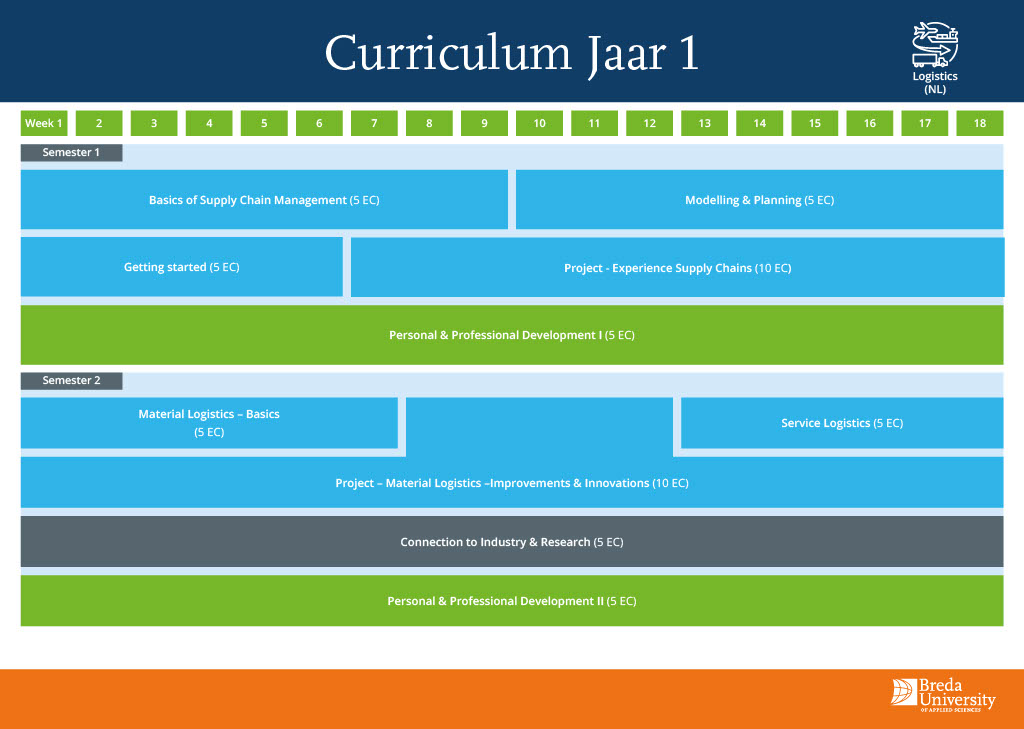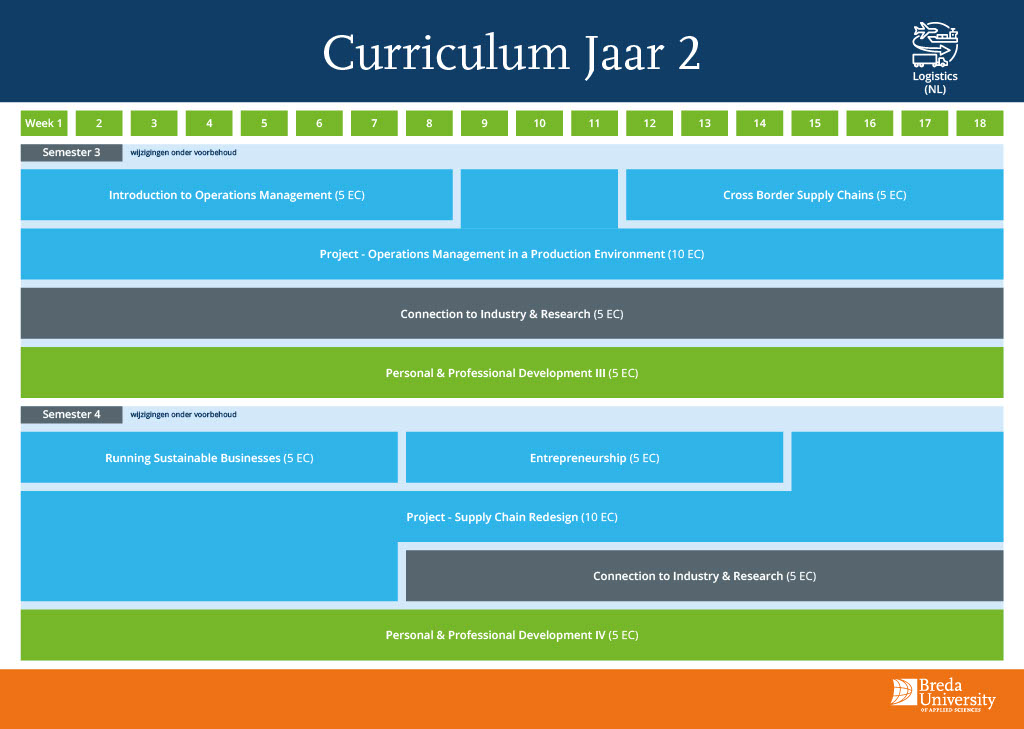Come and meet us
Walking around on campus is the best way to truly experience BUas. Sign up for one of the upcoming events or activities.
Want to make impact with smart use of data, technology and global teamwork?
Discover if Logistics is right for you with our quiz
- It only takes 3 minutes
- Your result in seconds
- Learn more about Logistics Management & Logistics Engineering
Start the quiz
Study overview
The first year, also called propaedeutic year, consists of two semesters, divided into four blocks (A through D). In this year, you lay the foundation by acquiring the necessary knowledge and skills that you will need later in your studies and professional practice.
- Semester 1
After a general introduction to logistics, you start working on real company assignments to explore the several functions and departments within businesses. You work in small groups on projects in which you apply the knowledge gained directly. In addition, you will learn about trends and innovations in logistics and supply chain management, such as robotisation, data, and AI. Examples of the modules you will attend are:
- Getting Started - You are introduced to the world of logistics at IKEA and learn about the steps in a supply chain, while reflecting on your own ambitions in the industry.
- Basics of Supply Chain Management - You learn about activities of various supply chains - from raw materials to delivery to the customer. Just think of sneakers, electronics, and fruit.
- Experience Supply Chain Management - You start a fictional manufacturing company through a simulation game and learn how to manage logistics processes and what data will be required for this purpose.
- Modelling and Planning - This module teaches you to visualise processes, create schedules, calculate costs and work with software systems.
- Personal & Professional Development - This module helps you find your way in the Logistics programme. It focuses on study skills and personal development.
- Semester 2
In semester 2 you will work on a project in which choosing a location and laying out a modern warehouse is central. Finally, you will learn all about online simulation of crowd flows in event logistics and care logistics. You will work on projects with other students regularly. Examples of the modules you will attend are:
- Material Logistics – Basics – You learn the basics of transport, storage, and inventory control, and how to predict with data how many products will be sold and how many products should be in stock.
- Material Logistics - Improvement & Innovation – You work on a project to set up a new distribution centre and improve existing logistics processes by deploying, for example, robots.
- Service Logistics - Basics & Innovation – You learn about service logistics, focusing on events and care. You will work in your group on a business case for real businesses such as Efteling or Pinkpop.
- Connection to Industry & Research – You apply the knowledge and experience acquired in practice-oriented situations in which you yourself will choose what business you want to work in.
- Personal & Professional Development – You explore your personal qualities, learn about cultural diversity, and make choices matching your ambitions.
- Alternative route
In year 1, you can still switch to Logistics Management. Logistics Management focuses on the business economics side and cooperation with customers and suppliers. You will learn about entrepreneurship, change management, and finance in the application of innovations.
Want to know more about what year 1 looks like? Have a look at the student handbook.
In the second year, you will have more freedom of choice. You will further expand your logistics knowledge and learn to work with simulations, software systems, and data science & AI in logistics.
- Year 2
In the second year you will have more freedom of choice. You will further broaden your logistics knowledge, and learn to work with simulations and software systems. You will address the following topics:
- Planning and optimising production processes: Learning how to improve production processes and managing international supply chains.
- Improving supply chains: Using data analysis, business intelligence and simulation software to redesign and enhance the supply chains of Decathlon.
- Cooperating with businesses: Working together with businesses on real research projects.
- Preparing for the work placement: Preparing for your placement and focusing on your personal and professional development.
At the end of the year, you can delve into a specific area of logistics:
- Production logistics
- Distribution logistics
- Warehousing
- Care logistics
- Event logistics
More detailed information about the themes can be found under the tab sheet ‘Specialisations.’
- Applied Data Science & Artificial Intelligence in Logistics
As from year 2 it will be possible for you to attend the Applied Data Science & Artificial Intelligence in Logistics track. In this track you will further specialise in developing data and AI applications for logistics. You will learn to work with challenging datasets, and how to use them for smart solutions to logistics problems. In addition, you will study programming, gain knowledge about how to deal ethically with data (what is and is not allowed) and learn to manage data projects. You can also choose to delve deeper into data and AI applications in year 3 or 4, during your work placement, minor programme and graduation project, for example. Curious about what issues you will work on? Have a look at the flyer.
- Transformative Airlines and Airport Management (TAAM)
Aviation is changing rapidly – and with TAAM, you can be part of it! It’s a 2-year specialisation combining four fields: aviation, logistics, facility management and tourism. While others focus on just one aspect, you’ll learn how everything comes together to create unforgettable travel experiences.
Who is TAAM for?
Students in Tourism Management, Facility Management, Logistics Management or Logistics Engineering who have successfully completed their first year can take this English specialisation in years 2 and 3.Learning by doing
No theory from textbooks – you learn by doing. From day one, you’ll work on assignments for companies like DHL, Sodexo, Eindhoven Airport, Rotterdam The Hague Airport, airlines and travel organisations. In year 2 of your specialisation, you’ll tackle a real-world challenge during a 20-week work placement.Leading the way in aviation
You’ll become a leader in airport management and business strategy, with an eye for customer experience and sustainability. You’ll learn how to make the travel industry greener using smart technology and circular solutions. All of this in small groups, with personal guidance and direct contact with industry professionals.- Year 3 and 4
Year 3
During the third year of the Logistics Engineering programme you will do a work placement for six months, followed by a specialisation in preparation for your graduation project.You will do a work placement at a host company for six months, where you will work on a project autonomously and put theory into practice. During your placement you will be guided by a supervising lecturer and a company supervisor and attend workshops for additional support.
After the placement, you will take a semester at BUas, specialising in one of the logistics fields of expertise. You will work on genuine issues within e.g. care, production or event logistics.
- You delve into how to organise and optimise national and international supply chain operations by, for example, new theory, business games and cooperation with experts from businesses.
- You work on challenging assignments from businesses seeking innovative solutions.
- You work on your personal and professional development in preparation for your graduation year.
Year 4
In the first half of year 4, you will take a minor and have 18 weeks to deepen or broaden your knowledge of a subject of your choice in the Netherlands or abroad. BUas offers a number of minors that are directly related to the core competencies of Logistics Engineering, such as the minor in Supply Chain Management.In the latter half of year 4, you will do a graduation placement at home or abroad. You will demonstrate that you have mastered all the required competencies to graduate. During your graduation placement you will work on a project, which could be, for example:
- Using drones for the Defence forces: Conducting research into the deployment of drones for supplying materials at dangerous locations quickly and safely.
- Automating Bol.com warehouses: Developing an automated system which orders can be processed with more quickly and cheaply.
- Event logistics at Pinkpop: Conducting research into a system enabling a faster admission process (arrivals, ticket scans and body searches) at Pinkpop.
You will write a thesis about this assignment, which you will present during your final exam. You will be personally supervised by both a supervising lecturer and a company supervisor. During talks with your supervising lecturer, you will talk about the content of your graduation assignment and your progress.
- Placement
During the third year of the Logistics Engineering programme you will do a work placement at a host company. During your placement you will work autonomously on an assignment or project matching your interests. This is your chance to apply everything you have learned and gain valuable work experience.
Work placements offer you the opportunity to:
- gain practical experience in a real work environment.
- expand your network with professionals in the logistics sector.
- discover what you like and what you are good at.
Examples of work placements:
- Automation at Nike: Conducting research into a robot system to accellerate goods flows at Nike’s distribution centre.
- Route planning at DHL: Developing a system with AI and data analysis to optimise delivery routes and shorten delivery times.
- Technical logistics at Lowlands: Designing a system with drones to monitor and improve visitor flows at the festival grounds.
- Stock management in emergency departments (A&E): Designing a smart system for A&E, so medical supplies are automatically replenished and always ready for use in emergencies.
Going on placement abroad is also an option, something BUas encourages. Read about the experience of Lynn van Dijk's in Australia.
- Exchange
Studying abroad is the perfect opportunity to push your boundaries. You build up an international network, learn a new language, and gain insight into intercultural differences. BUas works with universities all over the world, so as an exchange student you have plenty of options. For example:
- Austria: FH JOANNEUM - University of Applied Sciences
- Finland: South-Eastern University of Finland (XAMK)
- Ireland: National University of Ireland
- Mexico: Universidad Anáhuac Cancún
- Italy: University of Naples Parthenope
Read about Vera van Maanen's experience of her exchange in Finland.
- Minor
With a minor, you choose for yourself: do you want to specialise in your field or broaden your knowledge? You can take a minor at BUas, but you can also choose to do a minor at another Dutch university of applied sciences, or even abroad.
During your Logistics Engineering programme, you will develop theoretical knowledge and practical skills through various teaching methods.
- Projects: In projects, you put your knowledge into practice by optimising a warehouse, for example. You learn to work with teammates, which is important if you want to manage a team of logistics engineers in the future.
- Cases: In cases, you acquire professionally relevant knowledge and skills by attending lectures and actively working on assignments.
- Serious Gaming: These games help you understand logistics processes, make strategic choices and develop your decision-making skills.
- Company visits and excursions: By visiting businesses at home and abroad, you see how logistics works in business practice and learn from professionals.
- Learning in practice: During your studies, you continuously work on assignments for businesses. You gain practical experience during a work placement in the third year of Logistics Engineering, and you do your graduation assignment in the last semester.
English, mathematics and Excel
During your Logistics Engineering programme, you will receive guidance in fundamental subjects such as English, mathematics and Excel to prepare you properly for the challenges in the logistics sector.
- English: Logistics is an international field of expertise in which English is used a lot. If you scored a sufficiency for English during your final exams in secondary school, you will not need to worry about your knowledge of English. Is your English not that good yet? No worries, there will be extra classes and support available during the study programme, so you will have a good command of English at the end.
- Mathematics and Excel: You often work with numbers in logistics. You do not need to know complex mathematical formulas, but a basic understanding of Mathematics A would be useful. If you still find mathematics challenging, we will offer extra help and classes to enhance your skills. And Excel helps you to work with figures and databases conveniently. The following applies: is this new to you or did you find it challenging in secondary school? During your studies, you will gradually learn to work with it better and better.
Study load
The study load totals, on average, 40 hours a week. How many hours you actually spend on studying depends very much on the individual and varies from week to week. You will have class days on campus as well as days you schedule yourself to work on your projects on campus or at home.
- A typical week
An example of a typical week can be found below. Please note: the study timetable may vary each week, and this example only gives an indication.
Monday
- 09.00 - 10.00 Lecture about supermarkets facing logistic challenges of online deliveries
- 10.00 – 12.00 Assignment: improve customer satisfaction with online deliveries of supermarkets
- 12.00 – 12.30 Break (with fellow students)
- 12.30 – 14.00 Workshop about Finances & Logistics
- 14.00 – 15.00 Working on financial assignments; the lecturer is available for answering questions
Tuesday
- 10.00 – 12.00 Workshop about international logistics businesses
- 12.00 – 12.30 Break
- 12.30 – 14.30 Visualising international supply chains; main phase students are available for answering questions
- 14.30 – 15.30 Workshop about programming in Python
Wednesday
Working on individual assignments at home; preparing the project meeting on Thursday.Thursday
- 10.00 – 13.00 Working on an event site plan in a project group: where do you place the entrances, food trucks and bars?
- 13.30 – 15.30 Dragons Den: presentation to lecturers. Which group has the best event site plan?
- 16.00 hrs Drinks party of study society BELO
Friday
- 09.00 – 15.00 Excursion to the automated Bol.com distribution centre.
Coaching
During the Logistics Engineering programme you will be coached to further develop yourself personally and professionally. You will attend Personal & Professional Development modules and you will be coached individually.
Personal & Professional Development (PPD)
- Future perspective: What logistics specialisations and businesses do you find interesting?
- Workshops: You develop skills to study successfully and which are required to successfully do your work placement soon and work in the logistics sector.
- Reflection sessions: You evaluate your progress and development. What are you already good at, and what would you like to develop further?
Individual coaching:
- Tailor-made coaching: you receive personal guidance from a study coach on study and career choices.
- Feedback and development: You receive feedback on your performance and help with your development points from your study coach.
- Placement supervision: you are supervised by both a supervising lecturer and a company supervisor during your placement.
Student well-being
BUas encourages and helps you to make the most of yourself, whatever your circumstances. Maybe you have a chronic illness, are a family carer, a competitive athlete, or juggle your studies with running your own business? Our study coaches, student counsellors and student psychologists are here to help. Do you need extra support or advice? Or extra facilities? Then take a look at the options here.
In year 2 you can choose from the following specialisations, in which you will address questions raised by businesses.
- Production Logistics
In Production Logistics, you plan and organise the production process. In doing so, you coordinate and monitor planning and quality.
For example, you are responsible for a smooth production line in a Coca-Cola factory. You ensure that the bottles, labels and filling are continuously aligned and disruptions are dealt with without any downtime.
- Care Logistics
In Care Logistics, you optimise the flow of goods (equipment and medications), information (patient records and appointments), and people flows (patients and visitors).
For example, due to the aging population, there is an increasing demand for professionals in this field of expertise. At a hospital, for instance, you coordinate the operating theatres, ensure that patients are in the right rooms on time, medications are available, and the required equipment is present on time.
- Distribution Logistics
In Distribution Logistics, you ensure that products are transported from supplier to customer safely, quickly, sustainably, and as cheaply as possible.
For example, at companies such as DHL or at the port of Rotterdam, you will learn how to optimise the logistics surrounding the transport of Nike shoes. Distribution managers decided to transport right and left shoes separately to prevent theft and speed up processes.
- Event Logistics
In Event Logistics, you coordinate and optimise logistics processes around events.
For example, at a large festival such as Lowlands, you make sure that there are enough toilets, queues are prevented, and traffic is properly regulated.
- Warehousing
In Warehousing, you focus on improving warehouse equipment for efficient storage.
For example, IKEA allows customers to walk through the warehouse themselves to find products, which reduces staff and costs. Bol.com, on the other hand, has fully automated systems for packing and shipping orders, focusing on cost savings and efficiency.
As a student of Logistics, you will explore your field of expertise during excursions at home and abroad. You will visit the port of Rotterdam, for example, and go to a Nike warehouse or a Mercedes production plant. The cities of Stuttgart, Prague and Barcelona are recurring excursion destinations.
- Two-year track after an Associate degree in Logistics
With an Associate degree in Logistics, you can obtain our professional bachelor’s degree in Logistics Engineering or Logistics Management in two years’ time. You will first attend courses on production logistics, international supply chains and sustainability. After that, you will choose a logistics minor and do a graduation project or assignment with a company in logistics or supply chains.
- Three-year track after a related secondary vocational education (mbo) programme
Did you complete one of the following secondary vocational education (mbo level-4) programmes?
- Logistics Supervisor
- Specialist in Transport and Logistics
- Junior manager (in national or international) (wholesale) trade
- Specialist in international Port Logistics
- International business
Then you will be eligible for the mbo-hbo transfer track. You will be granted exemptions based on one of these secondary vocational education programmes. This allows you to complete the programme in three years (instead of four years).
What is the mbo-hbo transfer track?
At some institutes delivering secondary vocational education programmes that partner with BUas, you can start Logistics Management as early as in your final secondary vocational education year. This track runs from the beginning of February to the end of June. You attend classes with us every Wednesday for 18 weeks and do a project. If you complete the track successfully, you can directly enter year 2 of the professional bachelor’s programme. Ask your student counsellor whether your secondary vocational education institute participates in this track.Is it for you?
This track helps you explore whether professional higher education suits you. You will be enrolled as a course participant and pay no tuition fees. However, you can make use of our facilities. Visit an open day to get a taste of the atmosphere and talk to a student counsellor.Application
You can apply for the mbo-hbo transfer track via Studielink until 29 January.More information
If you would like more information, you can contact the student counsellors of Logistics, Minke Snel and Lizanne Hessels, at [email protected] or call (076) 533 2600. You can also download the leaflet about the mbo-hbo transfer track (information is in Dutch).- Three-year track after pre-university education (vwo)
To be able to complete this four-year programme in three years’ time, you must have several abilities in addition to your pre-university education (vwo) diploma. For example, you should:
- be able to plan your studies well;
- be able to learn and work independently;
- be able to take responsibility for your studies;
- really know what you want;
- enjoy working together with others.
You will go through three academic years consisting of 60 credits each, totalling 180 credits. You will start directly in the second year of study, and then attend the regular third and fourth years. Look for more information about the study programme under the tab sheet ‘years 2, 3 and 4’.
Guidance and transfer option
Participating in this three-year programme is quite a challenge. Therefore, you will receive intensive guidance from a mentor in the first year of the track. You will review your modules, results, and personal experiences in various talks. In our experience, pre-university education graduates can manage this just fine. If you should find that it is too difficult, you can switch to the regular first year, and complete the study programme in four years.Application
If you want to do this track, please follow the regular application procedure, and enter your preference for the three-year track in Studielink.More information?
For more information, please contact the student counsellors, Minke Snels and Lizanne Hessels, at [email protected] or call (076) 533 2600.- Three-year track after a propaedeutic certificate (professional or academic)
If you have a higher professional education (hbo) or university (wo) propaedeutic certificate or degree in the same field, please contact the student counsellors of this programme to discuss the possibilities of a three-year track: Minke Snels and Lizanne Hessels via [email protected].
At BUas you can choose from two logistics programmes: Logistics Engineering and Logistics Management. Both study programmes lay a solid foundation in logistics, and you will regularly work together on projects with students of the other programme. Still, there are significant differences:
Logistics Engineering
- Focus: The focus in Logistics Engineering is on technical and digital aspects of logistics processes. You learn how to optimise activities in production and distribution centres by using robots, drones, and AI.
- Modules: You work with simulation software tools to create new processes and learn to program with Python to solve problems.
- Example module: Decision Support Systems – Discover how to automate business processes, run simulations, and plan routes intelligently using modern technology.
Logistics Management
- Focus: In Logistics Management the focus is on business economics and collaboration with customers and suppliers. You learn about entrepreneurship, change management, and applying innovations in the supply chain.
- Modules: You are taught about legal and financial topics, entrepreneurship and develop skills to make changes in organisations and supply chains.
- Example module: Supply Chain Execution – You learn how to take important decisions that improve the logistics industry. The module addresses topics such as supply chain management and process improvement. You also learn to create business cases and play a business simulation game where cooperation is essential.
In year 1, you will have the opportunity to switch between Logistics Engineering and Logistics Management. In this way, you can discover which study programme suits you best.
At BUas, you develop your entrepreneurial skills in all programmes. You can also join BUas Startup Support (BUSS), where you attend networking meetings and receive guidance from a startup coach.
Would you like to graduate with your own company? You can do that at any academy, although a selection procedure may apply. Whether you are already generating revenue or just have an initial idea, BUas Startup Support will help you.
Read more about starting your own business.
What makes this study programme unique?
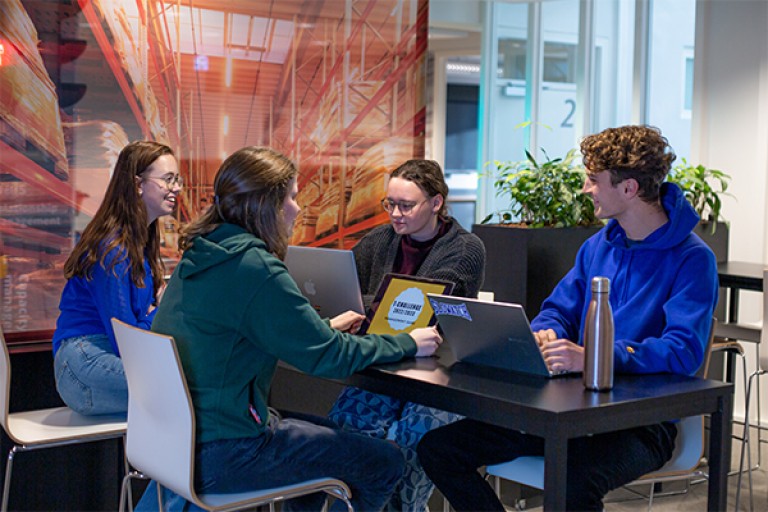
Design your studies
Create your own individual learning pathway by developing and fine-tuning the role that suits you in real-life projects.
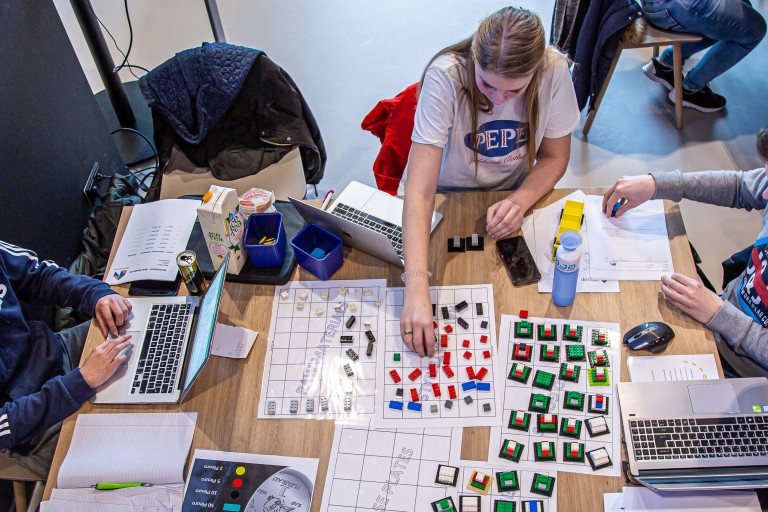
Logistics Game
Serious Gaming is used at BUas to provide an insight into logistics processes. In the first year you are given seven weeks to work on the Blokko game!

New: Logistics & AI
In year 2, choose Data Science & AI and become the specialist who uses data to make logistics smarter.
Admission & application
What are the admission requirements?
With a higher general secondary education (havo) or pre-university education (vwo) diploma, or an equivalent of these Dutch diplomas, you can be admitted to this bachelor's programme. You can also be admitted with a secondary vocational education (mbo level-4) diploma. If you do not meet these requirements, you can have a look at the options available to you.
Information about admission requirements
What does this study programme cost?
In the academic year 2026-2027 the tuition fee for bachelor's programmes is €2,694. In addition, you should take extra costs for software, excursions, etc. into account.
How can I apply?
If you meet the admission requirements, you can apply for this study programme. If you do so before 1 May, you can certainly start your studies.
What others say about Logistics

BUas felt right straight away

More than shoving boxes around

Practical learning

Your future starts here
- The job market needs you
Explore your career options - Choose your path
Discover your potential - Learn from the best
Graduates share their experiences
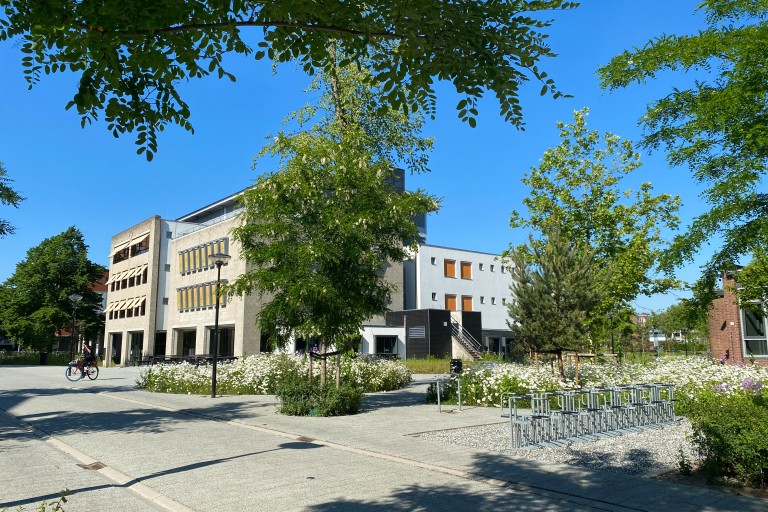
Virtual campus tour
We are proud of our campus. Have a virtual look and discover the Frontier building where you’ll be studying and what more the campus has to offer.
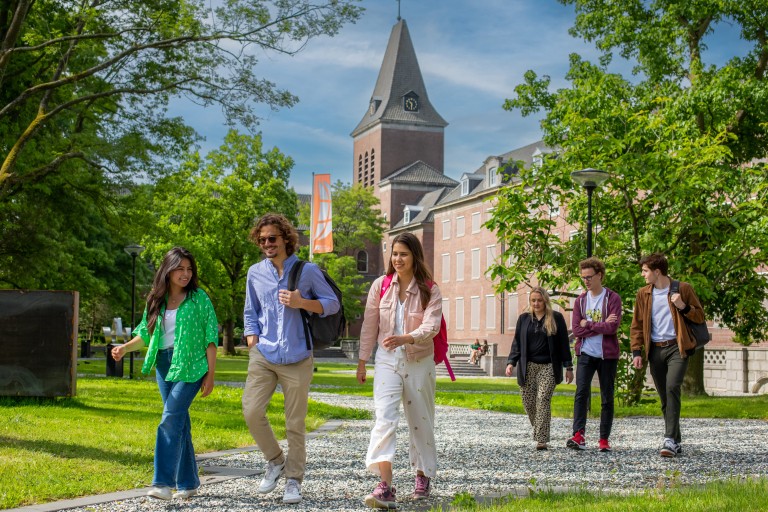
Studying at BUas
What is it like studying at BUas? What does the campus look like and what activities can be undertaken? Is Breda actually a vibrant university town?
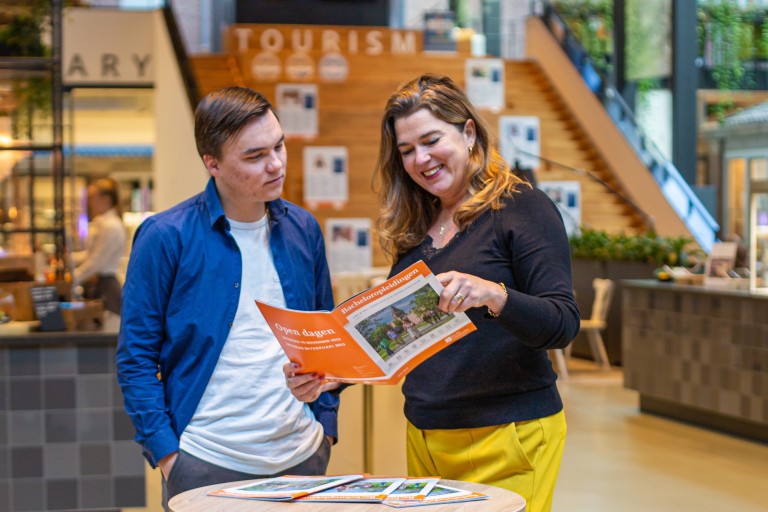
Assistance in choosing your study programme
Do you already know exactly what you want to study or do you not have any clue at all? Find out, compare and choose your professional/ academic bachelor’s or master’s programme at BUas.








